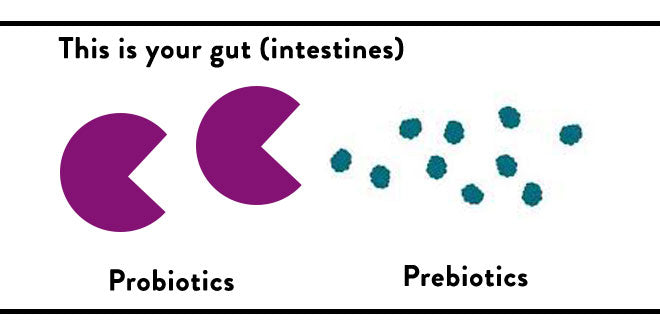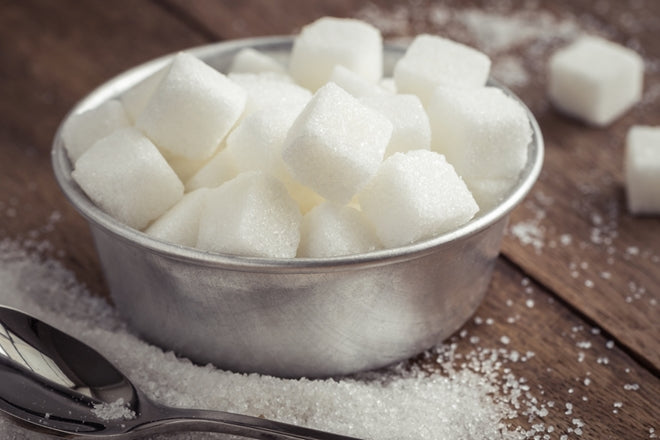You may have heard of the terms prebiotics and probiotics but do you really know what they are? What they do? And, why should we care?
Probiotics
Probiotics are, for the most part, bacteria (friendly microorganisms) that reside in our intestinal tract. Probiotics are often called "good" or "helpful" bacteria because they help keep your gut healthy by controlling the growth of harmful bacteria. We usually think of bacteria as something that causes diseases. But your body is full of bacteria, both good and bad.
Probiotics get into our intestines from foods we eat or supplements. There are many types of probiotics, and each one behaves a bit differently in our gut. Although the term "probiotics" is relatively new, we've been ingesting them for thousands of years. Any food that is cultured or fermented has probiotics (unless it has been heated before being packaged).
Benefits of Probiotics:
- Aid digestion
- Maintain the health of your gastrointestinal tract
The health benefits of probiotics are potentially wide and varied, but scientists are only starting to understand the complex symbiosis between the gut, the bacteria, and the rest of our body. There are some who call our gut the second brain, since it has so much influence over our entire body.
Some other potential health benefits, aside from keeping us regular, include:
- decreased diarrhea
- reduction of lactose intolerance
- strengthened immune system
- lower chances of colon cancer
- reduction of blood pressure and cholesterol
If you are prone to frequent or recurring stomach pain after eating, consider including probiotics in your diet or as a supplement.
Several clinical trials have shown that certain probiotic supplements can help reduce both gas production, as well as bloating, in people with digestive problems. However, other studies showed that probiotics can help reduce gas, but not symptoms of bloating.
By the way, when you are sick and take antibiotics, you're killing off the germs that made you ill, but also the probiotics. A healthy dose of prebiotics and probiotics during and after taking the antibiotic will boost your immune system again.
Some of the exceptionally powerful strains of probiotic bacteria that will specifically enhance digestion include:
- Lactobacillus acidophilus
- Lactobacillus fermentum
- Lactobacillus rhamnosus
- Bifidobacteria bifidum
- Bifidobacteria longum
Foods with Probiotics Include:
- yogurt, kefir, and buttermilk
- sauerkraut, kimchi and other pickled versions of veggies
- sourdough bread
- miso (fermented barley or soy or rice)
- tempeh - fermented soy
- kombucha - a fermented tea
It is important to note that pickles made with vinegar do not contain live probiotics. Pickles are cucumbers that have been pickled in salty water and fermented. They are low in calories and high in vitamin K. However, pickles made using vinegar do not have probiotic effects.
For the good bacteria (probiotic) to survive in the bowel, you need to feed them ‘prebiotic’ foods.
Prebiotics
Prebiotics are non-digestible food fibers (carbohydrates) that enable good bacteria (probiotics) to stick to the bowel wall and also helps to stimulate their growth. They are essentially food for the probiotics. They are carbohydrates that cannot be digested by the human body.
Prebiotics already live inside the large intestine.
In short, the Prebiotic is a specialized plant fiber that beneficially nourishes the good bacteria already in the large bowel or colon.
While probiotics introduce good bacteria into the gut, prebiotics act as a fertilizer for the good bacteria that are already there. As stated, the body itself does not digest these plant fibers.
In summary, Prebiotics are non-living, non-digestible carbs that serve as food for Probiotics.
The more food, or prebiotics, that probiotics have to eat, the more efficiently these live bacteria work and the healthier your gut will be.
Feeding these helpful bacteria keeps them doing what they are supposed to do in order to help our health.
Foods with Prebiotics Include:
- raw chicory root - the top source, with almost 60% fiber
- raw Jerusalem artichoke
- raw agave root
- bananas
- raw garlic, leeks, and onions
- whole grains
- honey
- fruits and vegetables
- legumes
When probiotics and prebiotics are combined, they form a synbiotic. Fermented dairy products, such as yogurt and kefir, are considered synbiotic because they contain live bacteria and the fuel they need to thrive. However, using coconut milk to replace dairy is even healthier.
Synbiotics refer to food ingredients or dietary supplements combining probiotics and prebiotics in a form of synergism, hence synbiotics.
Since each of us has different bacteria swimming around in our gut, the effects of the consumption of the same exact probiotics and prebiotics may be very different. Experiment with different foods and see what works for you. The best way to consume probiotics and prebiotics is via food, not supplements.
However, if you have a compromised digestive system, it will take a lot of food-based probiotics to restore your health. Whether you eat legitimate fermented vegetables (that need to be refrigerated every day), or you take a quality supplement, you will need to introduce a lot of them back into your gut for healing to occur.
Why Do We Need Both Probiotics and Prebiotics?
SIBO (small intestine bacteria overgrowth) occurs when the bacteria in our gut get out of balance and overgrow.
Our gut relies on nerves, muscles, enzymes, and neurotransmitters to properly digest food. While enzymes mainly break down our food, the nerves, muscles and neurotransmitters physically move the food through our digestive tract from the stomach to the small intestine and to the colon. When this happens in a healthy gut, bacteria get passed through the digestive tract along with the food to its final destination in the colon. Problems arise when something interferes with this process.
What Causes Bacterial Overgrowth?
- Damage to the nerves or muscles in the gut can result in leftover bacteria in the small intestine, increasing your risk for SIBO. For example, diabetes and scleroderma can both affect the muscles in the gut, leaving room for SIBO to develop.
- Physical obstructions in the gut, like scarring from surgeries or Crohn’s disease, can also cause an abnormal buildup of bacteria in the small intestine. Diverticuli, which are tiny pouches that can form in the wall of the small intestine, can also collect bacteria instead of passing it on to the colon, where it belongs.
- There are also medications that influence or disrupt the normal gut flora, such as antibiotics, acid-blocking drugs, and steroids.
- The most common cause is a diet high in all types of sugar (including fruits), refined carbohydrates and alcohol.
Now that we understand the importance of keeping the bacteria in our gastrointestinal tract in check, and we know that to do that is to maintain a healthy diet complete with foods that are high in prebiotics and probiotics, let us know what types of foods you eat to create that healthy glow in the COMMENTS Section below.





